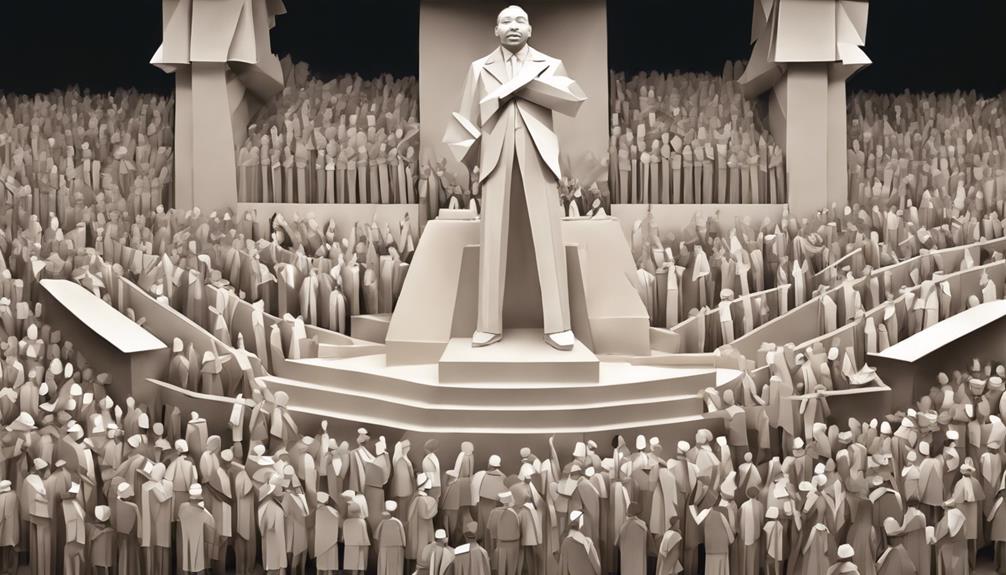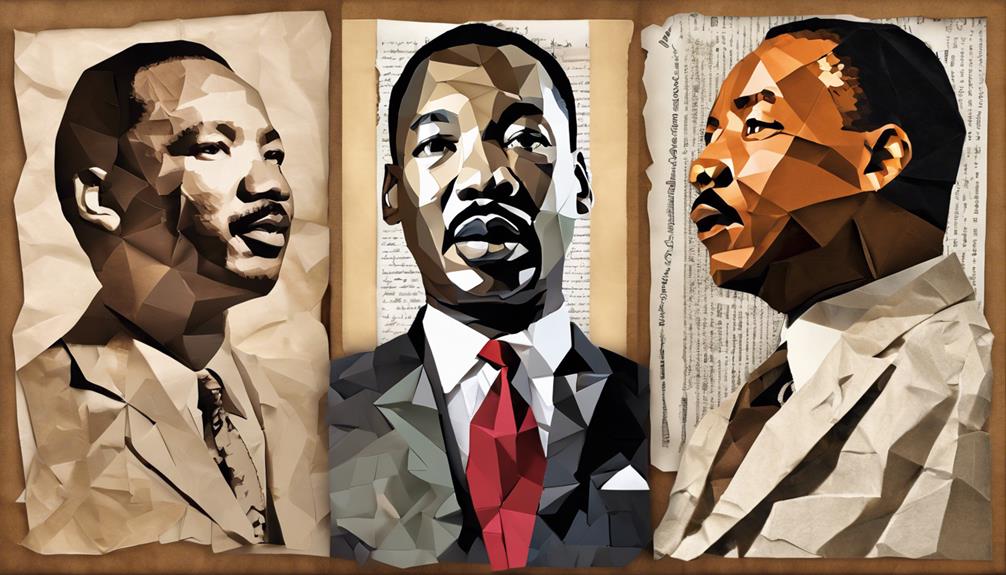You're about to discover the most influential speeches that reshaped modern society. Martin Luther King Jr.'s "I Have a Dream," Winston Churchill's "We Shall Fight on the Beaches," and Ronald Reagan's Brandenburg Gate Address are iconic speeches that left an indelible mark on human history, inspiring hope, courage, and transformation. These speeches ignited movements, empowered marginalized communities, and reshaped nations. They demonstrate the transformative power of words, inspiring generations to fight for equality and justice. As you explore these legendary speeches, you'll uncover the secrets behind their impact and discover how they continue to shape our world today, and there's much more to uncover.
Key Takeaways
- Martin Luther King Jr.'s 'I Have a Dream' speech inspired the civil rights movement and reshaped American history.
- Winston Churchill's 'We shall fight on the beaches' speech rallied Britain during World War II and boosted national morale.
- Ronald Reagan's Brandenburg Gate Address brought attention to the Berlin Wall and contributed to its eventual fall.
- Iconic speeches like these have inspired hope, courage, and transformative change in modern society.
- These influential speeches have empowered marginalized communities and advocated for equality, justice, and human rights.
Famous Speeches That Changed History
Throughout history, you've heard echoes of powerful orations that have reshaped the course of humanity, and it's often these iconic speeches that have sparked profound change.
One such speech is Martin Luther King Jr.'s 'I Have a Dream', which ignited the civil rights movement, calling for an end to racism and equal rights for all Americans.
Another iconic speech is Winston Churchill's 'We shall fight on the beaches', which demonstrated unwavering resolve against Nazi invasion during WWII.
You've also heard of Ronald Reagan's Brandenburg Gate Address, which boldly demanded the removal of the Berlin Wall, influencing the end of the Cold War.
These speeches, among others, have left an indelible mark on human history. They've inspired hope, sparked courage, and reshaped the course of humanity.
Iconic Voices for Human Rights

As you delve into the world of iconic voices for human rights, you'll find yourself surrounded by courageous individuals who fought tirelessly for equality and justice.
You'll discover how they used their powerful voices to stand up against racial injustice, empower the oppressed, and march towards a more equal society.
Through their remarkable speeches, you'll witness the transformative power of words that inspired generations to work towards a better world.
Marching for Equality
You're about to embark on a journey through time, exploring the iconic voices that paved the way for human rights, with Martin Luther King, Jr.'s 'I Have a Dream' speech being a powerful catalyst for the civil rights movement.
Delivered during the March on Washington in 1963, this historic speech called for an end to racial segregation and discrimination, echoing the cries of millions of Americans yearning for equality.
As you explore the world of iconic voices, you'll discover how King's words ignited a sense of urgency, inspiring a generation to take action against the injustices of their time.
With his charismatic leadership, King rallied the masses, emphasizing the need for collective action to dismantle the barriers that had long divided America.
His impassioned plea for civil rights resonated deeply, sparking a wave of protests, boycotts, and sit-ins that would ultimately reshape the course of American history.
Fighting Racial Injustice
What role have iconic voices played in combating racial injustice, and how have their significant words inspired generations to fight for equality and human rights?
One iconic voice that stands out is Martin Luther King Jr., whose 'I Have a Dream' speech in 1963 called for an end to racism and civil rights in the U.S. Before an audience of over 250,000 supporters, King's impassioned words ignited a sense of urgency, inspiring a nation to demand change.
His speech not only galvanized the civil rights movement but also continues to inspire future generations to fight against racial injustice. King's speeches, along with those of other influential figures, have played an important role in shaping the course of human rights.
Empowering the Oppressed
Beyond the fight against racial injustice, iconic voices have played a pivotal role in empowering the oppressed, using their words to challenge systemic injustices and inspire marginalized communities to demand their rights. You've likely heard of Martin Luther King Jr.'s iconic "I Have a Dream" speech, a beacon of hope for civil rights in the United States. Similarly, Mahatma Gandhi's Quit India Speeches rallied Indians to fight for independence from British colonial rule, showcasing the power of nonviolent resistance.
| Speaker | Speech | Impact |
|---|---|---|
| Nelson Mandela | Rivonia Trial Speech | Inspired resistance against apartheid in South Africa |
| Eleanor Roosevelt | Address to the United Nations | Emphasized human rights and equality globally |
| Malala Yousafzai | UN Speech | Advocated for girls' education and became a symbol of hope |
| Martin Luther King Jr. | "I Have a Dream" | Symbolized the Civil Rights Movement in the US |
These influential speeches have sparked movements, inspired change, and continue to empower marginalized communities today. By amplifying the voices of the oppressed, these iconic figures have left an indelible mark on human rights, shaping the course of modern society.
Shaping Nations Through Rhetoric

Through the power of rhetoric, iconic leaders have rallied nations, inspired social change, and shaped the course of history. You've likely heard the iconic phrases and speeches that have become ingrained in our collective consciousness. But have you stopped to think about the impact these speeches have had on shaping nations?
When we think of shaping nations, we think of leaders like Martin Luther King Jr., who advocated for civil rights through his powerful rhetoric. His 'I Have a Dream' speech is a prime example of how rhetoric can inspire social change.
Here are a few more examples:
- Winston Churchill's 'We shall fight on the beaches' speech, which rallied Britain during WWII.
- John F. Kennedy's inaugural address, which highlighted the importance of unity and international cooperation during the Cold War.
These speeches demonstrate the power of rhetoric in shaping national resilience, influencing global relations, and driving social movements. By examining these influential speeches, we can gain insight into how they've shaped modern society and continue to inspire change today.
Speeches of Freedom and Equality

As you reflect on the power of rhetoric in shaping nations, you're likely to find that some of the most influential speeches in history have been those that fought for freedom and equality, echoing the voices of the marginalized and oppressed. These speeches have ignited revolutions, inspired generations, and shaped the course of human history.
| Speaker | Speech |
|---|---|
| Martin Luther King Jr. | "I Have a Dream" (civil rights) |
| Nelson Mandela | Rivonia Trial speech (African freedoms) |
| Malala Yousafzai | UN speech (girls' education) |
These iconic speeches have left an indelible mark on modern society. Martin Luther King Jr.'s "I Have a Dream" speech, for instance, called for an end to racism and advocated for civil and economic rights in the United States. Similarly, Malala Yousafzai's UN speech emphasized the importance of girls' education, highlighting the value of equality and empowerment. These speeches have not only inspired change but have also become beacons of hope for those fighting for freedom and equality. Queen Elizabeth I's speech at Tilbury, although from a different era, demonstrates that the power of rhetoric has been a cornerstone of human progress throughout history.
War and Peace: Rhetoric's Impact

You've likely witnessed how speeches have steered the course of war and peace, shaping modern society's perceptions of conflict and harmony. Throughout history, influential speeches have played a pivotal role in shaping our understanding of war and peace. From rallying nations to promoting unity, these speeches have left an indelible mark on modern society.
Here are three examples of speeches that have had a profound impact on war and peace:
- Winston Churchill's 'We Shall Fight on the Beaches': During World War II, Churchill's speech rallied Great Britain, instilling determination and resilience in the face of adversity.
- John F. Kennedy's Inaugural Address: Kennedy's speech emphasized the need for international cooperation and the power to abolish poverty, promoting peace and unity.
- Martin Luther King Jr.'s 'I Have a Dream': King's iconic speech called for an end to racism and civil rights, delivered to over 250,000 supporters, highlighting the importance of equality and human rights.
These speeches, among others, have utilized rhetorical devices like repetition and impactful pauses to convey urgency and resolve. By emphasizing unity, peace, and commitment to human rights, these influential speeches have shaped modern society's views on war and peace.
Speeches in Times of Uncertainty

When uncertainty looms, speeches become beacons of hope, illuminating a path forward and guiding us through the darkest of times. You're not alone in feeling overwhelmed, and it's during these moments that inspiring speeches can be a lifeline.
Take, for instance, Martin Luther King Jr.'s civil rights movement, which rallied a nation towards equality and justice. During the Cold War era, John F. Kennedy's 1961 inaugural address inspired unity and cooperation. In more recent times, Malala Yousafzai's 2013 speech at the United Nations advocated for girls' education, shedding light on a critical issue.
These speeches serve as a reminder that even in the most uncertain of times, there's always a way forward. They offer direction, comfort, and reassurance that we're not alone in our struggles. As you navigate life's challenges, remember that speeches can be a powerful source of inspiration, guiding you through the toughest of times.
The Art of Powerful Speechwriting

As you begin crafting a powerful speech, you'll want to focus on crafting compelling openings that grab your audience's attention and mastering emotional connections that resonate with them.
A strong opening can make all the difference in setting the tone for your speech, and emotional connections can help your message stick with your audience long after you've finished speaking.
Crafting Compelling Openings
Crafting a compelling opening is crucial to drawing your audience in, as it sets the tone for the entire speech and establishes your credibility as a speaker. Think of it as a hook that grabs their attention and makes them want to listen to what you have to say. A great opening can make all the difference in delivering a memorable and impactful speech.
Here are three key elements to keep in mind when crafting a compelling opening:
- Use rhetorical devices: Techniques like anecdotes, quotes, or thought-provoking questions can add depth and interest to your opening.
- Establish your credibility: Show your audience why you're qualified to speak on the topic, just like Martin Luther King Jr. did in his famous civil rights speeches.
- Set the tone: Your opening should give your audience an idea of what to expect from your speech, whether it's inspiration, education, or a call to action.
Mastering Emotional Connection
You can create a lasting impact on your audience by mastering the art of emotional connection, which lies at the heart of powerful speechwriting. Think of Martin Luther King Jr.'s iconic speeches – they resonated deeply with people, inspiring them to take action and fight for change. That's the power of emotional connection in speechwriting.
When you craft messages that evoke strong emotions, you can motivate your audience to engage, empathize, and take action. Effective speechwriters use rhetorical devices like imagery and anecdotes to create an emotional connection with their audience. By doing so, they can deliver impactful messages that shape modern society.
To master emotional connection, focus on crafting stories that resonate with your audience's values and experiences. Use vivid language to paint a picture in their minds, and don't be afraid to show vulnerability and authenticity. Remember, emotional connection is key to delivering memorable and impactful messages that inspire real change.
Analyzing Rhetorical Masterpieces

What makes a speech truly unforgettable, and how do master orators like Martin Luther King Jr., Winston Churchill, and John F. Kennedy wield language to inspire and persuade?
You might think it's just about the words, but it's so much more. Effective speeches often use rhetorical devices like anaphora to create memorable rhythms and convey powerful messages.
To analyze rhetorical masterpieces, consider the following key elements:
- Context: Understand the historical and cultural context in which the speech was delivered.
- Techniques: Identify the rhetorical devices used, such as repetition, parallelism, and contrasts.
- Impact: Reflect on how the speech influenced society and shaped modern society.
The Enduring Legacy of Oratory

As you reflect on the rhetorical masterpieces that have shaped modern society, it becomes clear that the enduring legacy of oratory lies in its ability to inspire and ignite transformative change.
You can't help but think of iconic speeches like Martin Luther King Jr.'s 'I Have a Dream', which continues to resonate with audiences today. Oratory has played a pivotal role in advocating for civil rights, equality, and justice, sparking social change and empowering marginalized communities.
The power of oratory lies in its ability to ignite passion, resilience, and advocacy in individuals and communities. By understanding the historical context of these speeches, you'll appreciate their impact on modern society. You'll see how they've shaped the civil rights movement, influenced American history, and continue to inspire future generations.
As you explore deeper into the world of influential speeches, you'll discover the enduring legacy of oratory and its ability to inspire transformative change.
Frequently Asked Questions
What Is One of the Most Inspiring Speeches Ever?
You're wondering what's one of the most inspiring speeches ever? Well, it's Martin Luther King Jr.'s iconic "I Have a Dream" speech, which called for an end to racism and advocated for civil and economic rights.
What Famous Speech Changed the World?
You're wondering which famous speech changed the world? Well, Martin Luther King Jr.'s 'I Have a Dream' speech is often credited with sparking the Civil Rights Movement, inspiring a generation to fight for equality and justice.
What Are Some Famous Speeches in Modern Day?
You're curious about famous speeches in modern day, right? Well, let's investigate – you'll find powerful orations like Malala's UN speech, Obama's Selma address, and Greta Thunberg's UN climate speech, all shaping today's conversations on equality, justice, and sustainability.
What Are Three Famous Examples of Speeches You Can Find?
You're looking for three famous speeches, and you've come to the right place! You can find iconic speeches like Martin Luther King Jr.'s 'I Have a Dream', Winston Churchill's 'We shall fight on the beaches', and John F. Kennedy's Inaugural Address.
What Can We Learn from Famous Negotiators in Shaping Modern Society Through Speeches?
Studying the strategies of famous persuasion masters like Nelson Mandela, Martin Luther King Jr., and Winston Churchill can provide valuable insights into shaping modern society through speeches. By examining their negotiation techniques and the power of their words, we can gain a deeper understanding of effective communication and leadership.
Conclusion
As you reflect on the most influential speeches that shaped modern society, remember that words have the power to both unite and divide.
Ironically, the very same rhetoric that inspired freedom fighters also fueled war efforts.
Yet, amidst the chaos, these iconic voices continue to echo, reminding us that the art of speechwriting can be both a powerful tool for change and a catalyst for destruction.









